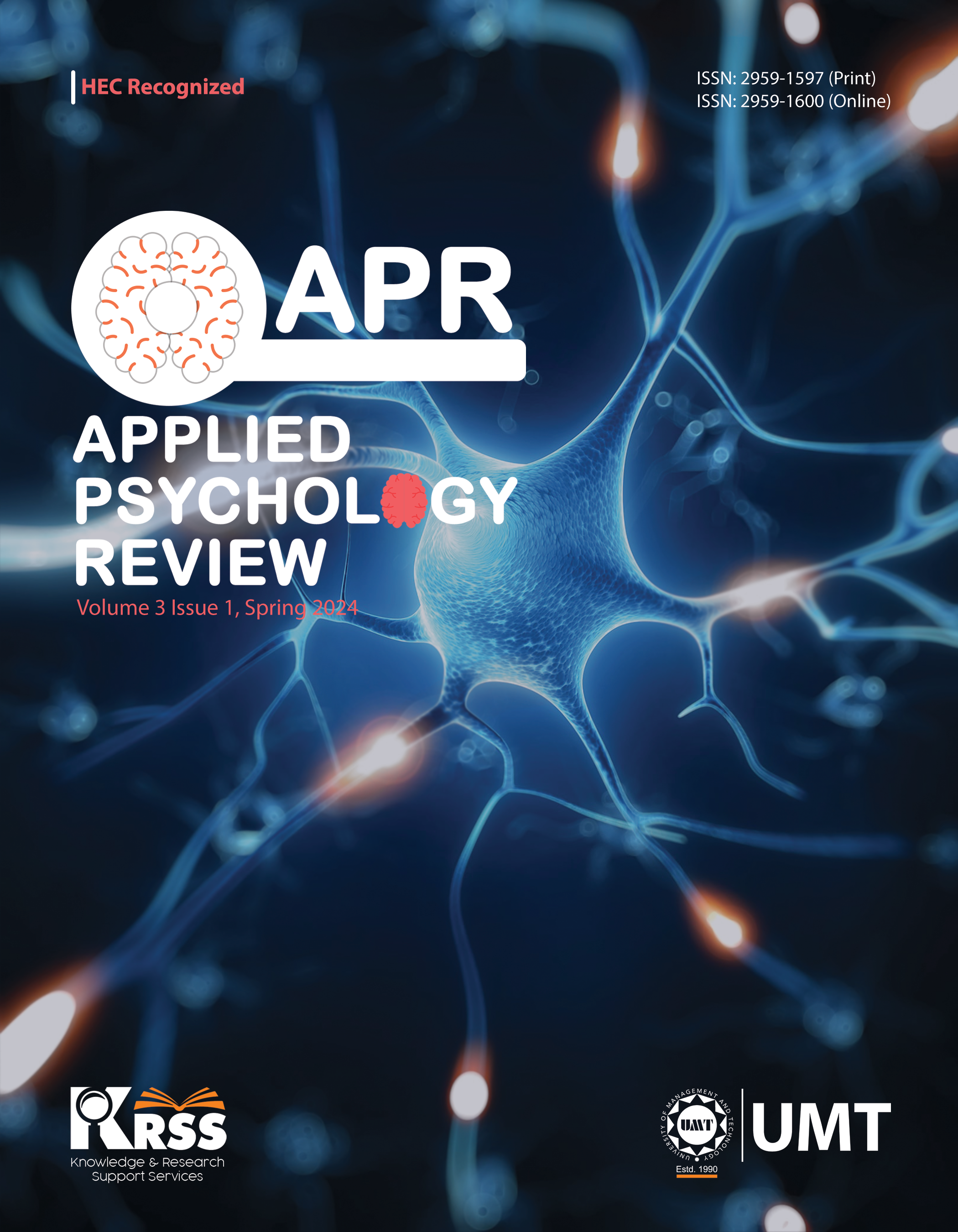Psychological Well-Being of Caregivers of Parents with Mental Illness: An Exploratory Study
Abstract
 Abstract Views: 0
Abstract Views: 0
The current study was conducted to explore the psychological well-being of caregivers having a parent with mental illness. The purposive sampling technique was used to conduct the study. A sample of 12 (8 women and 4 men) adults aged 18-40 years having parents with mental illness, such as schizophrenia, depression, and compulsive disorders were selected from the psychiatry ward of one of the government hospitals in Faisalabad, Pakistan. A focus group discussion was conducted through the trained facilitator. Thematic analysis was used to examine the data. Five major themes, namely significant impact on life, responsibilities, societal pressure, attention towards religion, personal, social and family dynamics, and nine sub themes, namely psychological impact, overall health affected, influence on academic performance, balancing caregiving and personal roles, social integration, religious strength, social life circumstances, family situation, emotions and feelings were extracted. The findings highlight the impact of parents’ mental illness on the well-being of adult caregivers in Pakistani context. Furthermore, findings may also help clinicians in tailoring the interventions accordingly to the context of the current study in order to enhance and improve caregivers' well-being.
Downloads
References
Adejumo, O. A., Iyawe, I. O., Akinbodewa, A. A., Abolarin, O. S., & Alli, E. O. (2019). Burden, psychological well-being and quality of life of caregivers of end stage renal disease patients. Ghana Medical Journal, 53(3), 190–196. https://doi.org/10.4314/gmj.v53i3.2
Ahmad, K. (2012). Informal caregiving to chronically III older family members: Caregivers’ experiences and problems. South Asian Studies, 27(1), 101–120.
Alyafei, A. H., Alqunaibet, T., Mansour, H., Tamizi Ali, A., & Billings, J. (2021). The experiences of family caregivers of people with severe mental illness in the Middle East: A systematic review and meta-synthesis of qualitative data. PLOS ONE, 16(7), Article e0254351 https://doi.org/10.1371/journal.pone.0254351
Anderson, R., & Bury, M. (2024). Living with chronic illness: The experience of patients and their families. Routledge.
Ar, Y., & Karanci, A. N. (2019). Turkish adult children as caregivers of parents with Alzheimer’s disease: Perceptions and caregiving experiences. Dementia, 18(3), 882–902. https://doi.org/10.1177/1471301217693400
Balouch, S., Zaidi, A., Farina, N., & Willis, R. (2020). Dementia awareness, beliefs and barriers among family caregivers in Pakistan. Dementia, 20(3), 899–918. https://doi.org/10.1177/1471301220915066
Bangerter, L. R., Griffin, J. M., & Dunlay, S. M. (2019). Positive experiences and self-gain among family caregivers of persons with heart failure. The Gerontologist, 59(5), E433–E440. https://doi.org/10.1093/geront/gny162
Bradley, C. J. (2019). Economic burden associated with cancer caregiving. Seminars in Oncology Nursing, 35(4), 333–336. https://doi.org/10.1016/j.soncn.2019.06.003
Braun, V., & Clarke, V. (2006). Using thematic analysis in psychology. Qualitative Research in Psychology, 3(2), 77–101. https://doi.org/10.1191/1478088706qp063oa
Braun, V., & Clarke, V. (2021). To saturate or not to saturate? Questioning data saturation as a useful concept for thematic analysis and sample-size rationales. Qualitative Research in Sport, Exercise and Health, 13(2), 201–216. https://doi.org/10.1080/2159676X.2019.1704846
Carlsen, B., & Glenton, C. (2011). What about N? A methodological study of sample-size reporting in focus group studies. BMC Medical Research Methodology, 11, 1–10. https://doi.org/10.1186/1471-2288-11-26
Cejalvo, E., Martí-Vilar, M., Merino-Soto, C., & Aguirre-Morales, M. T. (2021). Caregiving role and psychosocial and individual factors: A systematic review. Healthcare, 9(12), Article e1690. https://doi.org/10.3390/healthcare9121690
Cuijpers, P., & Smit, F. (2002). Excess mortality in depression: A meta-analytic review. Journal of Affective Disorders, 68(2–3), 227–236. https://doi.org/10.1016/s0165-0327(01)00413-x
Daher-Nashif, S., Hammad, S. H., Kane, T., & Al-Wattary, N. (2021). Islam and mental disorders of the older adults: Religious text, belief system and caregiving practices. Journal of Religion and Health, 60(3), 2051–2065. https://doi.org/10.1007/s10943-020-01094-5
Ehsan, N., Johar, N., Saleem, T., Khan, M. A., & Ghauri, S. (2018). Negative repercussions of caregiving burden: Poor psychological well-being and depression. Pakistan Journal of Medical Sciences, 34(6), 1452–1456. https://doi.org/10.12669%2Fpjms.346.15915
Fern, E. F. (2001). Advanced focus group research. Sage Publications.
Gérain, P., & Zech, E. (2021). A harmful care: The association of informal caregiver burnout with depression, subjective health, and violence. Journal of Interpersonal Violence, 37(11-12), NP9738–NP9762. https://doi.org/10.1177/0886260520983259
Glaser, B. G., & Strauss, A. L. (1967). The discovery of grounded theory: Strategies for qualitative research. Aldine.
Helgeson, V. S., Jakubiak, B., Van Vleet, M., & Zajdel, M. (2018). Communal coping and adjustment to chronic illness: Theory update and evidence. Personality and Social Psychology Review, 22(2), 170–195. https://doi.org/10.1177/1088868317735767
Hermanns, M., & Mastel-Smith, B. (2012). Caregiving: A qualitative concept analysis. Qualitative Report, 17, 1–18. https://doi.org/10.46743/2160-3715/2012.1727
Huang, G., Guo, F., & Chen, G. (2022). The role and wellbeing of female family caregivers in the provision of aged care in China. Social Indicators Research, 159(2), 707–731. https://doi.org/10.1007/s11205-021-02769-6
Imran, N., Bhatti, M. R., Haider, I. I., Azhar, L., Omar, A., & Sattar, A. (2010). Caring for the caregivers: Mental health, family burden and quality of life of caregivers of patients with mental illness. Journal of Pakistan Psychiatric Society, 7(1), 23–28.
Jabeen, S., Zakar, R., Zakar, M. Z., & Fischer, F. (2024). Experiences of family caregivers in dealing with cases of advanced breast cancer: A qualitative study of the sociocultural context in Punjab, Pakistan. BMC Public Health, 24(1), Article e1030. https://doi.org/10.1186/s12889-024-18404-1
Khalaila, R. (2020). Caregiver burden and compassion fatigue among Arab family caregivers of older relatives. Journal of Applied Gerontology, 40(7), 722–730. https://doi.org/10.1177/0733464820920100
Khalid, W., Rozi, S., Ali, T. S., Azam, I., Mullen, M. T., Illyas, S., & Kamal, A. K. (2016). Quality of life after stroke in Pakistan. BMC Neurology, 16(1), Article e250. https://doi.org/10.1186/s12883-016-0774-1
Kreuger, R. A., & Casey, M. A. (2009). Focus groups: A practical guide for applied research. Sage Publications.
Lalani, N., & Ali, G. (2021). Global APN case study in spirituality: Stories of hope from Pakistan. In M. Roger (Ed.), Spiritual dimensions of advanced practice nursing: Stories of hope (pp. 181–194). Springer
Lethin, C., Leino-Kilpi, H., Bleijlevens, M. H., Stephan, A., Martin, M. S., Nilsson, K., Nilsson, C., Zabalegui, A., & Karlsson, S. (2019). Predicting caregiver burden in informal caregivers caring for persons with dementia living at home–a follow-up cohort study. Dementia, 19(3), 640–660. https://doi.org/10.1177/1471301218782502
Liu, H., Fang, B., Chan, J., & Chen, G. (2019). The relationship between comorbidities in dementia patients and burden on adult–child primary caregivers: Does having a secondary caregiver matter? International Journal of Mental Health Nursing, 28(6), 1306–1317. https://doi.org/10.1111/inm.12640
Morgan, D. L. (1997). Focus groups as qualitative research. Sage Publications.
Moura, F. P., & Hamdan, A. C. (2020). Relations between subjective well-being and Alzheimer’s disease: A systematic review. Dementia & Neuropsychologia, 14, 153–158. https://doi.org/10.1590/1980-57642020dn14-020008
Noreen, N., Abdullah, M., & Lalani, N. (2022). Geriatric care in Pakistan: Current realities and way forward. Pakistan Journal of Public Health, 11(4), 214–219. https://doi.org/10.32413/pjph.v11i4.872
Petrini, M., Cirulli, F., D’Amore, A., Masella, R., Venerosi, A., & Venerosi, A. (2019). Health issues and informal caregiving in Europe and Italy. Annali Dell'Istituto Superiore Di Sanita, 55(1), 41–50.
Qadir, F., Gulzar W., Haqqani S., & Khalid A. (2013). A pilot study examining the awareness, attitude, and burden of informal caregivers of patients with dementia. Care Management Journals: Journal of Case Management; The Journal of Long Term Home Health Care, 14(4), 230–240. http://dx.doi.org/10.1891/1521-0987.14.4.230
Rashid, M. A. U., Muneeb, S. A., Manzoor, M. M., & Fischer, F. (2023). Religious coping, care burden and psychological distress among informal caregivers of COVID-19 patients: Results of a cross-sectional survey in Pakistan. International Journal of Social Psychiatry, 69(6), 1369–1376. https://doi.org/10.1177/00207640231162277
Rayment, G., Swainston, K., & Wilson, G. (2019), Using photo-elicitation to explore the lived experience of informal caregivers of individuals living with dementia. British Journal of Health Psychology, 24, 102–122. https://doi.org/10.1111/bjhp.12342
Saleem, T., Saleem, S., & Tahan, M. (2024). Assessing caregiving burden in family caregivers of depression & schizophrenia in Pakistan. Neuropsychopharmacologia Hungarica, 26(2), 86–93.
Schulz, R., & Sherwood, P. R. (2008). Physical and mental health effects of family caregiving. American Journal of Nursing, 108(9), 23–27. https://doi.org/10.5175/JSWE.2008.773247702
Siddiqui, S. P., & Khalid, J. (2019). Determining the caregivers’ burden in caregivers of patients with mental illness. Pakistan Journal of Medical Sciences, 35(5), 1329–1333. https://doi.org/10.12669/pjms.35.5.720
Sivakanthan, S., Cooper, R., Lopes, C., Kulich, H., Deepak, N., Lee, C. D., Wang, H., Candiotti, J. L., Dicianno, B. E., Koontz, A., & Cooper, R. A. (2024). Accessible autonomous transportation and services: A focus group study. Disability and Rehabilitation: Assistive Technology, 19(5), 1992–1999. https://doi.org/10.1080/17483107.2023.2242898
Steenfeldt, V. O., Aagerup, L. C., Jacobsen, A. H., & Skjødt, U. (2021). Becoming a family caregiver to a person with dementia: A literature review on the needs of family caregivers. SAGE Open Nursing, 7, 1–14. https://doi.org/10.1177/23779608211029073
Tamizi, Z., Fallahi-Khoshknab, M., Dalvandi, A., Mohammadi-Shahboulaghi, F., Mohammadi, E., & Bakhshi, E. (2020). Caregiving burden in family caregivers of patients with schizophrenia: A qualitative study. Journal of Education and Health Promotion, 9(1), Article e12. https://doi.org/10.4103/jehp.jehp_356_19
Truglio-Londrigan, M., & Slyer, J. T. (2019). Caregiver decisions along the Alzheimer’s disease trajectory. Geriatric Nursing, 40(3), 257–263. https://doi.org/10.1016/j.gerinurse.2018.10.015
Vu, M., Mangal, R., Stead, T., Lopez-Ortiz, C., & Ganti, L. (2022). Impact of Alzheimer’s disease on caregivers in the United States. Health Psychology Research, 10(3), Article e37454. https://doi.org/10.52965%2F001c.37454
Wang, S., Cheung, D. S. K., Leung, A. Y. M., & Davidson, P. M. (2020). Factors associated with caregiving appraisal of informal caregivers: A systematic review. Journal of Clinical Nursing, 29(17–18), 3201–3221. https://doi.org/10.1111/jocn.15394
Wright, L. M., & Leahey, M. (2013). Nurses and families: A guide to family assessment and intervention. FA Davis.
Zwar, L., Angermeyer, M. C., Matschinger, H., Riedel-Heller, S. G., König, H.-H., & Hajek, A. (2021). Are informal family caregivers stigmatized differently based on their gender or employment status? A German study on public stigma towards informal long-term caregivers of older individuals. BMC Public Health, 21(1), 1–14. https://doi.org/10.1186/s12889-021-11955-7
Copyright (c) 2024 Ansa Talib, Adan Ijaz

This work is licensed under a Creative Commons Attribution 4.0 International License.




